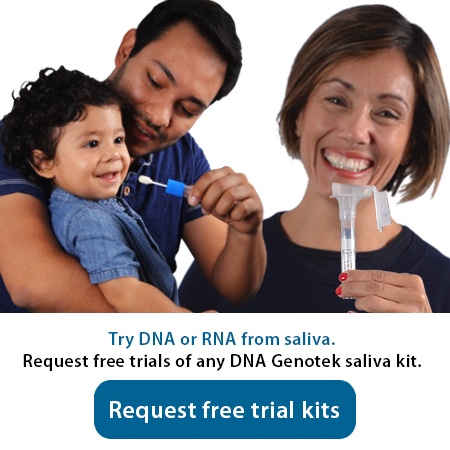2012-05-07
Collecting saliva DNA is more effective and less costly for genetic research, a study suggests. The study, titled Specimen Collection within the CRN: A critical appraisal, was produced by The CRN Pharmacovigilance Project Genomics Working Group. The overall goal of the genomics working group was to explore issues surrounding the collection and use of biological specimens at the participating CRN sites. This report is one of the most comprehensive analyses by an organization on the cost-effectiveness of blood and saliva sample collection for DNA applications. The saliva collection analysis was based on the Oragene kit.
As part of the study (see pages 18-20), budget estimates for both blood and saliva specimen collection were developed. The majority of costs were attributed to personnel expenses with the assumption that the personnel effort would be the same for either collection method, as these costs are primarily associated with tasks related to administrative responsibilities (e.g. IRB, compliance, recruitment). However, when comparing costs that are unique to each collection method, saliva collection was 48% less costly than blood collection – an astounding savings.
Most of the savings in the model were attributed to transportation and storage of the samples from point of collection to processing. Blood samples require dry ice, overnight shipping and freezers while Oragene saliva samples can be stored at room temperature and transported via regular mail. The data was based on assumptions, with conservative estimates of only a 20% donor compliance rate which included financial incentives. Other studies have shown that it is common to achieve compliance rates of 70-95% with saliva without the cost of donor incentives.
In addition to finding reduced costs with saliva, the report referenced a significant number of other advantages to using Oragene to collect saliva samples. The authors noted that the DNA quality and yield from the Oragene kits is superior to other non-invasive collection methods (e.g. buccal swabs) and cite Oragene as the preferred method for collection of saliva. Other advantages noted include the convenient and painless nature of saliva sample collection which is generally more acceptable to study participants and the ability to collect samples via the mail instead of during a clinical visit. The report also highlighted that venipuncture is often the main reason for recruitment refusal in particular when a separate visit to a research clinic is required. Otherwise compliant research subjects balk at the time and effort to make a special clinic visit, even when an incentive is offered.
In addition to being less costly than blood to collect, DNA from saliva is equivalent to DNA from blood for downstream analysis.
While many considerations such as quality of DNA, compliance, collection location, transportation and storage concerns may factor into decisions about DNA collection methods, cost-effectiveness analysis is an essential tool. It can guide decisions about where to best spend limited resources while meeting research goals.
In these economically challenging times, this report confirms the efficacy and cost-effectiveness of saliva collection with Oragene. If you could reduce your specimen collection costs by nearly 50% without sacrificing DNA quality and increase donor compliance, would you?


